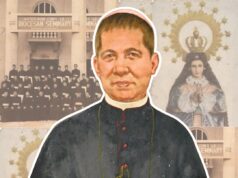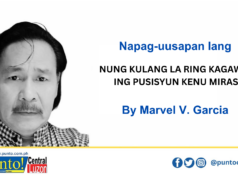What is wrong with political dynasties? Everything. What‘s right with political dynasties? Nothing.
But, let us put this matter in context to get a good bird’s eye view, so to speak. Despite all the imagined balance of power – judicial, legislative and executive– the country operates tightly in “pakikipagkapwa-tao” and loosely feudal mind set.
For a start, visit your friendly neighborhood barangay and count how few families, one or two with maximum of three, control and exchange election posts through the years.
And you really need to be “close” (meaning that public and public transactions have high degrees relational inclusivity and emotional investment), preferably a relative, to these barangay officials to get your much-needed barangay certificates or any public service for that matter.
For all our posturing as a democratic nation, there is indeed very limited democracy, at least the way the contemporary, mostly American definition of the term implies.
For one, democracy and poverty, posits the 1998 Nobel Prize laureate Armantya Sen, do not make good bedfellows, or for that matter, freedom and poverty.
But then again, Sen’s democracy might be a different dog from ours. Neighboring countries, such as Indonesia, for example calls itself democracy, or to be precise about it “demokrasi” drawing itself from its old tribal if not Islamic tradition of running the country by the council of the elders.
The brazen disregard of the Constitutional prohibition by ruling families against political dynasties is not because there are no actual laws to punish those who violate.
Do we really expect the Aquinos, the Marcoses, the Estradas, the Arroyos, the Ponce-Enriles, the Cayetanos and practically the whole Congress to create laws barring them from their precious pork barrels, seriously?
Why the pork barrels? Because this is what political dynasties is all about: power and money.
However, the trampling of the Constitution is true to and embraced by rulers as well as the governed.
Democracy (or the absence of it) as expressed in the Constitution, after all, is not only a system of governance, but more importantly, an individual and collective mind set. So, don’t expect the politicos to go against it, nor will we expect an Edsa-drawn energy to rise soon to repel political dynasties.
When Erap declares that the “final decision” is still with the people, he very well knew the operational mind set of the “people” he spoke of.
The people are largely materially poor and uneducated in the ways of American brand democracy. In actuality, the best Filipino transactional exchanges, and the one the Filipino is most rich about, be it economic, political or social, are gestures of acceptance, hospitality and generosity.
The more expansive, more precise, and probably more complex tag for this socio-political and economic transaction was coined by the late Filipino Psychologist Virgilio Enriquez. He calls it “pakikipag-kapwa”.
Of course, the status is open for abuse as the Spaniards and American conquerors learned quickly, and exhaustively exploit them for their advantage.
In other words, the Spanish and American conquerors, if we are to look at it, were bereft of “kapwa” to us, calling us pejorative term as Indios or little brown monkeys despite our visible and pure acceptance, hospitality and generosity.
In contemporary times, these exploitative, abusive and feudal transactions are widely expressed and used in small and huge scale financial support and largesse all the way to the irritatingly silly bill board reminders of so and so politicians making so and so public projects.
We know how long or far these exploitative, abusive and feudal relational transactions operate.
The ballots are not far distant areas, after all. Enriquez disabuse these transactions as anything but pakikipag-kapwa tao.
The more cunning the politician, the more sure fire he will exploit, act and mouth out, display and peacock his acceptance, hospitality and generosity to poor constituents pre and during the elections.
He will eat bare hands with poor folks; even carry on cue their babies. The politicos will descend to their constituents’ deplorable nooks to show kapwa or solidarity. Nothing is pure and spontaneous here.
These gestures are calculated and get intense when a camera is on. We all know this.
To further cement the imagined kapwa or ties, politicos will act as ninongs and ninangs to weddings and baptisms, visit family celebrations or even pay for caskets of dead constituents. Again, we all know this.
Ergo, the politico, aside from his innate voracious appetite for money, will hold on to his pork barrel or any source of dirty money to support this cycle of vice. This is how feudal lords and fiefs relationships operate.
I-will–help-you-but-you-are–beholden-to-me love/hate affair. This is not kapwa. This is feudal mind set 101.
Better still, this is how dysfunctional and useless American brand democracy is to us.
Seriously, it is as if the whole country is one big hacienda (again an imported concept).
When the ruling families clash, it is not because they stand for some political party ideologies or moral order or for that matter expressing their “pakikipag-kapwa tao” to us. Quite often, it is because these families are operating on their self-imposed privileges and are simply threatened by another set of equally voracious families.
When Senator Alan Peter Cayetano shouts foul to those who rail against political dynasties without identifying “those who are corrupt and who are not”, the more lost we are. I am sure the good Senator is familiar with the saying: finding a needle in a hay stack, or to be more exacting and pro-poor about it, finding a decent meal in a hard day’s work, if there is work at all.
As a quick-fix solution he adds: “equal opportunity for those who have money and those who don’t”. We’re tossed to a labyrinth.
But then again, this hardly is the issue. An operational mind set works glaringly here, that is, the politicos are in a habit to think, due to education and family training, that governance is the sole privileged of the moneyed and their families (most often, these are one and the same).
Of course, we are familiar with politicians exaggerating their serve-the-people stance for engaging in politics. Some even claim that it runs in their blood. Really?
In reality, you don’t even need a decent education, as the young Revilla of Cavite shows; all you have to do is to be a Revilla. You can even impregnate a girl outside of marriage as long as you claim it’s yours.
Good publicity but bad morality. This again, is feudal mindset 101, and not pakikipagkapwa-tao.
But then again, who is asking for good education or a sturdy moral fiber to govern?
The idea in American brand democracy that governance must be reserved to anyone with intellectual, emotional and moral maturity to govern regardless of class, race (as in the case of Barack Obama), gender or social status has been absent to the inner and cosmic universe of the Filipino.
Or if it is present, nobody seems to be so willing to act on it.
Material and family interests are the stronger motivations, after all. Definitely, this is far from notions of American-brand democracy.
From the conception of this country as a nation a hundred or so years back, we are still grappling with the supposed ideals of this American- installed democracy.
In the mean time, the nation, despite its American pretense education, is operating in pakikpag-kapwa tao, if not stuck in a highly feudal mind set. Senator Aquillino “Koko” Pimentel challenges us with the issue of clearly defining political dynasties.
But this is putting the carriage before the horse. We all know this.
Perhaps the larger and more complicated question is: What is democracy to Filipinos? Better still:
Can this American brand of democracy survive in a society ripe with kapwa and to some extent feudal minds?
Is it possible to fathom and design our brand of democracy based from our ancestral and age-old treasures of pakikipagkapwa-tao and wove them into big and small institutional structures?
You can connect: tobe_wtdppor@yahoo.com




